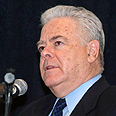
Sneh. 'Fatah gaining strength'
צילום: עופר עמרם
Deputy defense minister: We'll mull Barghouti's release
Sneh says in lecture before Council for Peace and Security Israel will have to weigh jailed Fatah leader's release in future; states Hamas becoming more and more radical, Israel should ally with moderates
Is the defense establishment set to revise its stance regarding the release of jailed Fatah leader Marwan Barghouti? During a lecture Sunday, Deputy Defense Minister Ephraim Sneh said that there would come a time when this issue would have to be looked into.
"Barghouti is the Palestinian people's most popular leader. We helped him gain this status. Granted, there is a legal problem, but we will have to solve it," Sneh told the Council for Peace and Security.
Speaking about the diplomatic plan, Sneh provided a lengthy explanation about the internal situation in the Palestinian Authority. He estimated that Hamas will remain a radical element, prepare for a third intifada, aid al-Qaeda-like organizations to establish themselves in the PA and continue to preach hatred towards Israel.
Sneh said that the way to defeat Hamas was by finding a Palestinian partner and creating a diplomatic horizon.
"Hamas is trying to create a situation of distress, despair and diplomatic dead-end, in a bid to draw the public in the direction of the terrorist stance. We need to work in the exact opposite direction, and find the moderate elements in order to act against Hamas' strategy," Sneh said.
Peace with Palestinians to help Iran issue
The deputy minister also noted that despite the feelings among the Israeli public, Hamas' popularity is declining, while Fatah's is on the rise. Sneh continued to specify the timetable for a full Israeli withdrawal from B areas in the territories, which according to a plan formulated by Defense Minister Amir Peretz will be handed over to the Palestinians in about six months.Sneh referred in his lecture to the Iranian issue, and linked it to the conflict with the Palestinians. Sneh said that as long as the local conflict existed, fewer countries would be willing to support action against Tehran.
"This is another reason why we should end the Palestinian conflict," he stressed.
He added that "action should be taken against Iran in the form of sanctions forbidding import of fuel distillates and limiting bank credit in the European system."
Turning his attention to Syria, Sneh emphasized that despite its calls for peace, Damascus had no intentions of disassociating itself from Iran.
"They are not even doing the minimum to prove that they are interested in some kind of process, on the contrary. They continue their struggle to topple Lebanese Prime Minister Siniora's government, and we believe that they are also working to reinforce Hizbullah," he said.
In response to a question Sneh said that Israel was certainly under the threat of a chemical attack.










